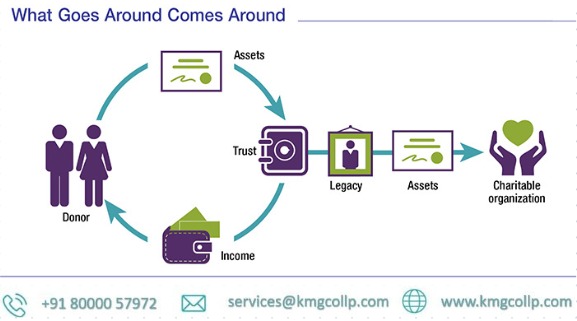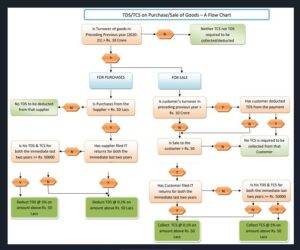
Beneficent/strict trusts are the trusts which are shaped with a target of giving help to poor, instruction, clinical alleviation, safeguarding of climate/landmarks , headway of objects of overall population utility, strict reason, and so forth. Concern has always been expressed regarding their taxation. The Income Tax Act of 1961’s sections 11-13 apply to the trust’s entire income—house property, capital gain, or any other income—rather than the trust’s specific provisions. I’ve gone over the most important aspects of taxing charitable/religious trust income in this section.
Income of charitable/religious trust can be classified as follows:-
- Voluntary Contributions (donations) Section 11(1)
Voluntary contributions are basically the donations received by the charitable/religious trust which form part of income of the trust.
They are of two types:
1) Donations received with specific direction that they shall form part of corpus fund Such donations are exempt
2) Donations received without such specific instruction Such donations shall form part of income from trust property
- Income From Property held under trust for charitable and religious purposes
|
Particulars |
Taxability |
||||||||||
|
15% of gross receipts from such trust property |
Exempt |
||||||||||
|
85% of gross receipt from such trust property |
|||||||||||
|
i. Income Applied for Charitable Purposes in India |
Exempt (Sec11(1))to the extent to which applied for the following purposes: |
||||||||||
|
Income deemed to be applied for charitable purpose in India: |
-Exempt in case : |
||||||||||
|
In any other case |
-Exempt in case : |
||||||||||
|
II. Income not applied for charitable/religious purpose in India |
♠ Exempt (sec 11(2)) in case accumulated for specific purpose in India subjected to the following conditions: A) Assessee gives notice to Assessing officer specifying purpose and period (cannot exceed 5 years) of accumulation before assessment is complete. B) Accumulated amount is deposited /invested in specified form. ♠ Withdrawal of Exemption in the following cases (sec11(3)):
|
||||||||||
|
Not accumulated for specific purpose in India |
Taxable in case income is not applied for charitable/religious purpose in India and is also not accumulated for specific purpose in India. |
- Capital Gains (Sec 11(1A)
The capital gain arising from the transfer of a property held by religious/charitable trust shall be taxable as under:
1) Cost of new asset ≥ net consideration from asset sold → Entire capital gain is exempt
2) Cost of new asset < net consideration from asset sold → Capital Gains Exempt = Cost of new asset less Cost of old asset
- Anonymous Donations (Sec 115BBC)
- Q) What are anonymous donations??
- A) Anonymous donations are basically the donations where the person receiving the donations doesn’t maintain any record of the person giving the donation. E.g. – Offerings given in temple in donation box.
Taxability
Step 1: Compute the total amount of anonymous donation received by the charitable/religious institution
Step 2 : Compute 5% of the total donations(corpus donations + anonymous donations + other donations not forming part of corpus)
Step 3 : Select the higher of the following two:
- a) Amount computed in step 2 or
- b) 1,00,000
The amount computed in step 3 shall be exempt and the remaining amounts of anonymous donations are taxable in the hands of such charitable/religious institution @ flat 30% (115BBC)
Cases where anonymous donations shall not be taxable u/s 115BBC
1) Where donations are received by trust established WHOLLY for RELIGIOUS purpose (no charitable purpose). E.g.-donations given by devotees to trust owning a temple.
2) However in case such religious/charitable trust also runs a school/medical institution/educational institution ,etc and the donations are received with specific direction that they are for such school/institution then such donations shall be taxable
Anonymous donations not taxable u/s 115BBC → taxable as per section 11 & 12
Anonymous donations taxable u/s 115BBC → not exempted u/s 11 & 12
Section 13: Section 11 not to apply in certain cases:
- Entire income from the property held under a trust for private religious purposes which does not enure for the benefit of the public.
- Entire income of a charitable trust or institution created or established for the benefit of any particular religious community or caste.
- Entire income of the following charitable/religious trust:- a) where any part of the income of such trust is used for the benefit of any person specified under sec 13(3) or b) Where any property of the trust id used for the benefit of any person specified under sec 13(3)
- Entire income of a charitable /religious trust whose funds are not invested in modes specified under section 11(5).
FAQs
Can a charitable trust be a religious trust?
The Income Tax Act makes a distinction between Trusts for charitable purposes and those for religious purposes, though both are entitled to exemption under section 11 of the Act. The creation of religious charitable trusts is governed by the personal laws of the religion.
What is income tax on a charitable trust in India?
We have discussed below income tax on various categories of income of charitable trust: Exempt* to the extent of 15% of such income. This means at-least 85% of income from property to be applied for charitable and religious purpose in India as above and balance 15% can be accumulated or set aside.
Are public religious trusts exempt under Section 11 & 13?
ICT (ITAT, Visakh) 67 DT 330] The conditions for exemption of Public Religious Trusts under sections 11, 12 & 13 are the same as those for Public Charitable Trusts. A trust solely for religious purposes is exempt in its own rights under section 11 through donation to such trust would not qualify for deduction under section 80G.
Disclaimer: The materials provided herein are for informational purposes only and do not constitute legal, financial, or professional advice. Consult relevant laws and experts before acting on this information. Neither the author nor K M GATECHA & CO LLP is liable for any inaccuracies or omissions. This material is purely educational and not an advertisement or solicitation.




Table of Contents
Toggle



